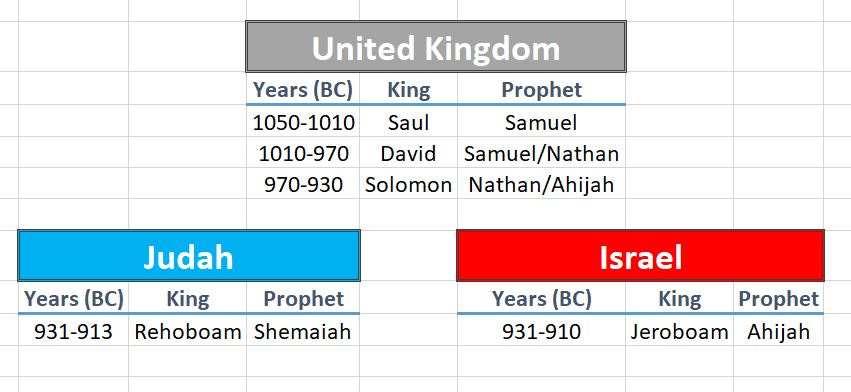The King Who Listened to the Wrong People
The reign and life of King Rehoboam.
Beginning with Rehoboam, the United Kingdom of Israel divides and will remain that way for several hundred years.
We will bounce back and forth between the kings of the northern and southern kingdoms, but I will try to help us keep things straight as far as what’s happening in each kingdom.
Here is what our timeline looks like so far, I’m using dates from Bible Gateway.
I’ll keep adding to this timeline as we go further in our study of the kings.
Rehoboam’s Foolish Decision.
Rehoboam heads to Shechem for the coronation ceremony to officially make him king. But this meeting begins a little bit differently. Israel calls for Jeroboam to return from Egypt to be their spokesman at the ceremony. Israel asks Rehoboam to lighten the load Solomon had placed on them (1 Kings 12:1-4).
Rehoboam wants three days to consider the matter and he consults two different groups.
The first group was the leaders who had served under King Solomon, and they advised Rehoboam to be a servant to the people. If he would do this, the people would serve him forever. But Rehoboam rejected their advice (1 Kings 12:6-8).
The second group was the young men who had grown up with Rehoboam - it seems they are his friends and he identifies himself with this group when he asks them, “How should we answer the people?” They advise Rehoboam to go even harder on the people than Solomon had (1 Kings 12:9-11).
So on the third day, Jeroboam and the nation of Israel come back to Rehoboam to hear his answer - and they do not like what they hear. Rehoboam foolishly decided to go with his friend’s advice.
Then the king answered the people roughly, and rejected the advice which the elders had given him; and he spoke to them according to the advice of the young men, saying, "My father made your yoke heavy, but I will add to your yoke; my father chastised you with whips, but I will chastise you with scourges!" (1 Kings 12:13-14)
We are reminded that Rehoboam’s foolish decision was the hand of God at work (1 Kings 12:15).
The Kingdom Divides.
After hearing what had to have been one of the worst, most out-of-touch political speeches of all time, Israel abandoned Rehoboam. However, the tribe of Judah remained loyal to Rehoboam (1 Kings 12:16-17).
Rehoboam sends Adoram - who was the “supervisor of the work crews” (NET) after the leaders of Israel - no doubt to tell them to “get back to work.” But the Israelites executed him by stoning, and Rehoboam got in his chariot and high-tailed it back to Jerusalem (1 Kings 12:18).
Other than Judah, the rest of the tribes of Israel made Jeroboam their king (1 Kings 12:19-20).
When Rehoboam gets back to Jerusalem, he immediately starts gathering his military together to take Israel back by force, but God sends word to Rehoboam through the “man of God” Shemaiah.
"Speak to Rehoboam the son of Solomon, king of Judah, to all the house of Judah and Benjamin, and to the rest of the people, saying, 'Thus says the LORD: "You shall not go up nor fight against your brethren the children of Israel. Let every man return to his house, for this thing is from Me." (1 Kings 12:23-24)
To Rehoboam’s credit, he obeyed God’s command and did not go fight the northern tribes.
An Overview of Rehoboam’s Reign.
After focusing on the reign of Jeroboam in the northern kingdom, the narrator shifts back to Rehoboam and concludes the record of his reign with a brief overview of some major events that happened during his time on the throne.
Rehoboam was 41 years old when he came to the throne and reigned for 17 years. His mother was Naamah - an Ammonitess - and she likely played an important role as “queen mother” during his reign (1 Kings 14:21).
The nation of Judah did evil during Rehoboam’s reign and provoked God more than previous generations had done. Idols and idol worship were widespread in Judah - as well as the sexual perversions that went along with idolatry (1 Kings 14:22-24).
During Rehoboam’s fifth year as king, Shishak the king of Egypt came against Jerusalem with a massive army (2 Chronicles 12:3) and carried away the treasures in the temple and the king’s palace. God allowed Egypt to come against Rehoboam because “he forsook the law of the LORD, and all Israel along with him” (2 Chronicles 12:1). The invasion by Egypt was a direct consequence of Judah’s sin against God (2 Chronicles 12:2).
Rehoboam had bronze shields made as a replacement for the gold shields Shishak carried away - showing just how much things had declined since the days of Solomon (1 Kings 14:25-28).
Shemaiah gave a message from the Lord to the king, telling him why this had happened. To their credit, the leaders and Rehoboam humbled themselves before God and said, “The LORD is righteous” (2 Chronicles 12:5-6). Because they humbled themselves, God did not allow the Egyptians to destroy them (2 Chronicles 12:7-8). After Rehoboam humbled himself, “things went well in Judah” (2 Chronicles 12:12).
However, there was no peace between Rehoboam and Jeroboam throughout their reigns (1 Kings 14:30).
When Rehoboam died after 17 years on the throne, he was buried in the City of David, and his son Abijam took his place (1 Kings 14:31). The final analysis of Rehoboam’s life is that “he did evil, because he did not prepare his heart to seek the LORD” (2 Chronicles 12:14).
Crowning Principles.
Accepting wise advice is critical for godly leaders.
Listening to and accepting good advice is wise. “The way of a fool is right in his own eyes, But he who heeds counsel is wise” (Proverbs 12:15). Rehoboam is known in Scripture as a fool because he rejected the wise advice of his father’s advisors, and listened to the advice of his own foolish friends.
We need to seek out and listen to advice - not just listen to people who are going to tell us what we want to hear. Sometimes the best advice will be exactly what we would rather not hear. Wisdom involves listening to wise counsel, even if it’s not something you’d rather do.
Humility after mistakes can prevent something worse from happening.
Just as it is wise to listen to good advice, it is also wise to humble ourselves when we’ve done wrong or made a mistake. “When pride comes, then comes shame; But with the humble is wisdom” (Proverbs 11:2). Rehoboam showed wisdom in humbling himself after being rebuked by God’s prophet.
Humbling yourself and admitting mistakes is not something our world believes “strong leaders” ought to do. Stubbornly and arrogantly refusing to humble ourselves and admit when we were wrong can lead to something much worse happening. If Rehoboam had not humbled himself, it seems God would have allowed the king of Egypt to destroy him. Those who refuse to humble themselves are actively resisting God (James 4:6).
And that sort of thing doesn’t turn out too well.





Really appreciate this study! That'll Preach! thank you for all you do here brother!